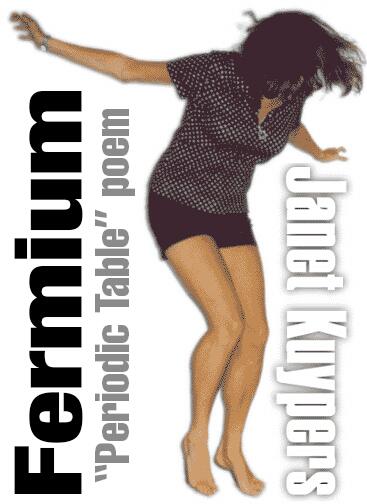Fermium
Janet Kuypers

from the “Periodic Table of Poetry” series (#100, Fm)
including the poem “Each Half is the Enemy”
8/10/13
When the bulldog ant of Australia
is cut in half,
the halves see each other as enemies.
The head attempts to devour the tail.
And the tail,
in an effort to defend itself,
battles for up to thirty minutes
to sting the head.
And this battle happens everywhere
in the world, because life is always
that battle
between the two halves of the whole.
#
Because everything contains that twin,
one part good,
and one part you’ve construed into something
so horribly wrong. And you want to tear it apart,
that other half,
you despise everything about it —
everything that somehow is a part
of you.
So you, in life, always possess that battle.
#
This even applies on a molecular level.
Consider hydrogen:
it’s in our water we drink and bathe in,
and atomically, we’re sixty-seven percent
hydrogen.
But on November first nineteen fifty two,
“Ivy Mike” was the code name
for the first
successful test of the hydrogen bomb.
It’s funny how we can take something
so needed for our life
and, like our sun, turn it into something
to destroy everything we know.
Because as I said,
one side gives life, the other kills.
#
And thanks to “Ivy Mike” and that
hydrogen bomb,
two elements were discovered —
one of them was named after physicist
Enrico Fermi.
You see, Fermi worked on “Chicago Pile-1,”
the first nuclear reactor. Fermi worked
in a space
under Chicago University’s then unused
football stadium bleachers. That’s because
the school
had not used the football stadium
for three years, because the school
thought sports
were a distraction from academics.
Fermi, “the father of the atomic bomb”.
also worked
on the Manhattan project, and Fermilab
outside of Chicago was named after him.
And here’s the kick:
the hydrogen device that produced
Fermium was designed by Richard Garwin,
Enrico Fermi’s student.
So for all that Enrico Fermi had done,
it seems fitting that Fermium is
the heaviest
element formed by the nuclear
bombardment of lighter elements
(like hydrogen).
And this highly radioactive element
was initially kept secret due to the
cold war.
But it’s amazing what we can discover
while taking something we so need
for life,
and turning it into an instrument of death.
#
Because Fermium was classified
in the cold war,
Swiss scientists bombarding oxygen,
discovering an isotope if it, and wanted
to name it
centurium (to honor element one hundred).
Good thing Fermi’s nuclear work got
declassified, so they
could honor Enrico Fermi with “Fermium”.
But wait, Fermium is bad, it’s radioactive,
there can’t be
any good applications for it…
Well, consider the two sides of any twin:
Fermium’s the only
element that can use it’s alpha particles
in radio therapy for cancer. And yes,
it’s radioactive,
but it’s short half life means it decays
quickly. Because as I said, it’s amazing
how two sides
can be both bad, and also so good.
